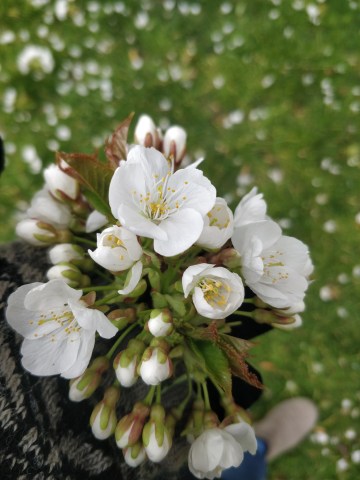Natural Medicine

A sound engineer friend had a baby monitor in his kitchen. One night, without any warning, the plug caught fire. “Can you smell smoke?” asked the missus, and in they ran to find flames beginning to lick up the walls. They got it out in fairly short order, but in the process my friend suffered some burns to his hands. It was frightening, but thank the heavens, could have been much, much worse. “Imagine if we were asleep,” he fumed, “I don’t even want to think about it!”
As burns went they remarkably mild, and the entire family, thankfully, got away with a horrible scare rather than a tragedy.
He ran his hands under cold water, and then applied a mixture of tumeric and raw honey to the skin, daubing on regular extra doses over the next twelve hours. When he came to work the next day, he held his hands up triumphantly. “See?” he exclaimed. “It is really the stuff.”
As a lighting engineer, I spend a lot of time getting gently burnt on a huge array of electrical equipment, and I gotta say, I was hugely impressed by how well his hands seemed to be healing. Raw honey and tumeric – maybe there’s something in this shizzle?
“It has to be raw honey,” he exlained. “We never use medicines. If you have bruised hands,” (boy, I do) “then I recommend arnica.”
“I use arnica!” I replied brightly. “There’s mixed evidence as to how effective it is, but none to suggest it’s actively bad for my stick-based bones.”
“Hum…. there are other poultices you could try.”
“Yeah… or if it gets really bad I might go to the doctor.”
“Mate, you don’t want to do that. Natural remedies, that’s what you need. Doctors are just going to try and sell you unnatural shit.”
At this point I changed subjects quickly. Don’t get me wrong – always up for a conversation – but we had a long sound check in front of us and a remarkably rude artist on stage, and I wasn’t sure if these things were going to combine well with my knee-jerk reaction of “whooaaaa there tiger…”
Thankfully, words on the page are easier than words muttered over the sound of snare drum, so here we are.
Let’s start at the fluffy end of this conversation.
- Pharmaceutical companies have a well dodge reputation. And don’t get me started on nutrient companies who are frequently selling you very expensive urine and an unobtainable lifestyle. A great deal more money is spent on curing the diseases of the rich by private industry, than, say, working to eradicate HIV. However! Your local GP isn’t a pharmaceutical company, especially in the UK where every medicine prescribed on the NHS is put through intense scrutiny. And the government is out to screw the NHS anyway, which just adds to the sacred motto: if a doctor prescribes you something, they’ve probably got a damn good reason.
- Doctors make mistakes! Oh wow, they make mistakes, and people get hurt. You know what else hurts people? Taking asparagus juice to cure cancer. Statistical likelihood of a GP getting something badly wrong: pretty darn low, but high enough that you’re ok to seek a second opinion given that it’s your body, your health, your choice. Statistical likelihood of that tumor being cured by homeopathy: none. Just none. The maths is very much on science’s side. (Side bar: with public healthcare, you are in a way better position to go seeking that second/specialist opinion than, if, say, you’re financially struggling in a system where every second spent trying to solve the problem is gonna put you in debt. Just saying….)
- To paraphase Tim Minchin – you know what they call a natural remedy that has been proven to work? MEDICINE. Science is soggy with medicines derived from, say, willow bark (aspirin) or bread mould (penicillin) or poo (yeap, faecal transplants are an actual thing, yay nature!) and is constantly running studies to try and prove and disprove the effecacy of a thousand things besides. If it’s proven to work, then hurrah for raw honey and tumeric! And if it’s proven to have no more success than a placebo, then meh, at least it tastes ok when you lick the spoon after. “Science” and “nature” are not in conflict. This is a false battle, to a large extent created by commerce. On one side, it is the very essence of science to try and prove itself wrong, and to constantly seek to strive, learn and evolve. (Watching physicists get excited by the idea of data that disproves Einstein is always a delight; watching priests worry that God might be proven not to be real, less so.) On the other hand, peddlers of both “natural” and “lab-prove super-dooper vitamin-filled science pills!” remedies are interested in making cash, and consequently don’t care what science says if it threatens the bottom line. So if a double-blind study with a sizable sample returns the answer that your remedy is, in fact, made of wishful thinking and dollar signs, what you tend to find is that people attack science itself. “Of course the scientists would say that, they don’t understand nature,” is the gist of the sentiment, and one which needs kicking in the nuts fast. These are false fueds we are being sold.
- As we’re getting less fluffy, let’s take a moment to celebrate some excellent and awesome things that have been achieved by those pesky lab coats, such as the eradication of smallpox, the near-eradication of polio, the asthma drugs that mean I’m not dead yet, the insulin that means diabetics aren’t dead yet, and all of antibiotics ever which means that ear infection hasn’t actually killed you. Not to mention, say, sanitation, which has really done a number on the old favourites such as hookworm and cholera. These aren’t localised events – these are achievements that affect all of humanity, and arguably should be held up as one of the great pinnacles of human achievement. If someone’s looking for a new Wonder to put next to the Pyramids, you could do a lot worse than a shrine to soap, control groups and vaccines. And sure, we’ve got some problems. The over-consumption of antibiotics means that our antibiotics are getting less effective. The anti-vaxxing movement is endangering herd immunity based on thoroughly disproved arguments. But this isn’t on science. This is on people ignoring data. As early as the 1940s Alexander Fleming was warning that antibiotics had to be handled carefully, because bacteria evolve faster than people. Data doesn’t lie; science isn’t your enemy; it’s us, cocking things up, that’s the problem here.
- On a theme of data, not paying attention hurts people. Going to the doctor is always frightening. Going to a hospital is terrifying. We desperately want easy answers to our pain, and there’s nothing quite like being told that the distilled essence of a dandelion will make it better. And maybe you do feel better for a while; the placebo effect of being told something will make you feel good is an incredible thing. But feeling better isn’t treating a bacterial infection or a violent immune responce. Not treating, not engaging in science, not engaging in data, hurts people. Sometimes it hurts more than just you; we are a society packed together in ever-denser packs of people. The pandemics of today are global, and spread in a matter of days, not months. It is our responsibility to seek answers, even if they scare us, and to be honest about them.
Sometimes that honesty might be “hey, raw honey is a thing, we should totally look into that and do it more!” – and that’s awesome! Go honey! But sometimes it might be “nope, that’s no good, let’s use something else”. Sometimes we’ll make mistakes. Sometimes we’ll find great leap forwards. But to reject science off-hand is to make a mockery of the foundations on which the current health and achievements of humanity are built. Please don’t.
Let’s do a study instead.





